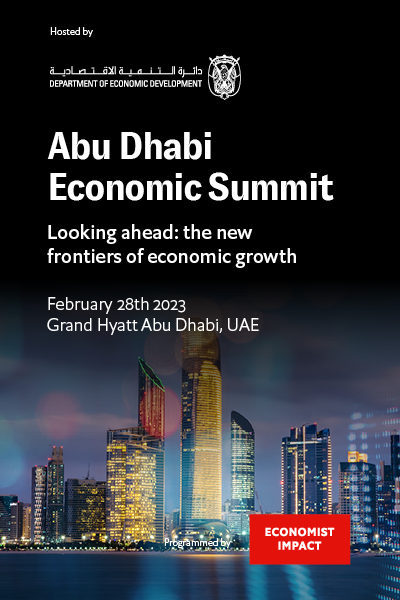The Abu Dhabi Economic Summit, hosted by the Abu Dhabi Department of Economic Development (ADDED) and programmed by Economist Impact on 28 February 2023, will bring together experts from the worlds of government, business, finance and technology to explore new frontiers of growth.
Taking place under the theme ‘Looking Ahead: the new frontiers of economic growth’, the one day summit will map the new contours of the global economic landscape, asking what has changed in the past five years and identifying the best approaches to capitalising on trends including digitisation and sustainability. Over 25 speakers and 300 attendees from the worlds of government, business finance and technology will gather in Abu Dhabi on 28 February 2023 to consider strategies and solutions.
The summit will highlight the unique circumstances of the Middle East and the GCC in particular. It is a region with a growing population and increasing geopolitical relevance. Oil prices and interest rates have a direct impact on its fortunes. The fact that many regional currencies are pegged to the US dollar has historically yielded benefits, but questions are increasingly being asked about its logic. Other parts of the world have struggled in the current climate of uncertainty and volatility, but with the right vision and action, the Middle East has the potential to harness macroeconomic shifts to its long-term advantage.
The interplay between the government and private sector will be a consistent theme. Private trade and investment is the essential engine of economic growth. However, states around the world have a responsibility to provide some level of support and regulation so that economic growth is equitable. The nature of state intervention in the economy is a particularly important question in the GCC, where, spurred by the pandemic, governments across the region are taking bold steps to rebalance economic structures and elevate the role of the private sector. Speakers and panellists will discuss policy options available for governments, in addition to strategies for strengthening national capabilities and blueprints for developing corporate ecosystems which are innovative and dynamic rather than bureaucratic and backward-facing.
Another topic present throughout the dialogue will be sustainability. Whether it is in questions of how best to respond to the threat of inflation, or how to manage the processes of automation and digitisation, decision-makers will need to account for the social and environmental externalities of the policies and programmes they enact. Building towards a greener and more efficient economic model is imperative, and experts will discuss how to maintain focus on this goal despite the distractions of economic cycles and short-term politics.
The summit will also examine the so-called “talent crunch”. Navigating to the new frontiers of economic growth will require a different sort of workforce; one in which digital skills are at a premium and employers must fight harder than ever to attract socially conscious employees. Participants will consider how organisations must adapt to find, develop and keep the best people in an increasingly competitive global marketplace.
Abu Dhabi Economic Summit will look at the status quo through a wide-angled lens, producing creative and considered conclusions about how the world – and the middle east in particular – can emerge from the post-pandemic years stronger and more prosperous than ever.
Speakers at the conference will include:
- E. Rashed Abdulkarim Al Blooshi, undersecretary, Abu Dhabi Department of Economic Development
- E. Sameh Al Qubaisi, director general of economic affairs, Abu Dhabi Department of Economic Development
- E. Khalfan Belhoul, CEO, Dubai Future Foundation
- Issam Abousleiman, country director of GCC countries, Middle East and North Africa, The World Bank
- Maryam Ficociello, chief governance officer, Red Sea Global
- Emmanuel Nyirinkindi, global vice president for cross-cutting solutions, International Finance Corporation
- Simon Williams, chief economist CEEMEA, HSBC
- Luca Barbi, general partner and COO, Saudi Technology Ventures
- Ronaldo Mouchawar, chief executive officer of Souq.com and vice president MENA, Amazon
- Saeeda Jaffar, group country manager and senior vice president GCC, Visa
- Roberto Croci, managing director, value creation & transformation office, Public Investment Fund (PIF)
- Nili Gilbert, vice chairwoman, Carbon Direct
- Navin Gupta, managing director, South Asia & MENA, Ripple Labs
- Vijay Tirathrai, managing director, Riyadh Techstars
- Rand Ghayad, head of economics and global labour markets, Linkedin
- Martin Tricaud, group head of investment banking, First Abu Dhabi Bank
- Anshu Vats, global head of public service practice and UAE market lead, Oliver Wyman
- Jason Channell, managing director, head of sustainable finance, Citi
- Rashid Bashir, CEO – Middle East, Deloitte Consulting
- Bassel Al Nahlaoui, managing director of mobility, Careem
- René Matthies, chief financial officer & executive director of corporate operations, Emirates Water and Electricity Company
- Carla Slim, executive director, economist MENA, financial markets, Standard Chartered
- Louise Collins, head of engineering & energy MEA, and head of project & development services UAE, JLL
- Thom Straight, general manager, head of talent acquisition EMEA, Microsoft
- Jeanne Walters, senior economist, global markets and treasury, Emirates NBD
- Marketa Simkova, head of people and change, KPMG







